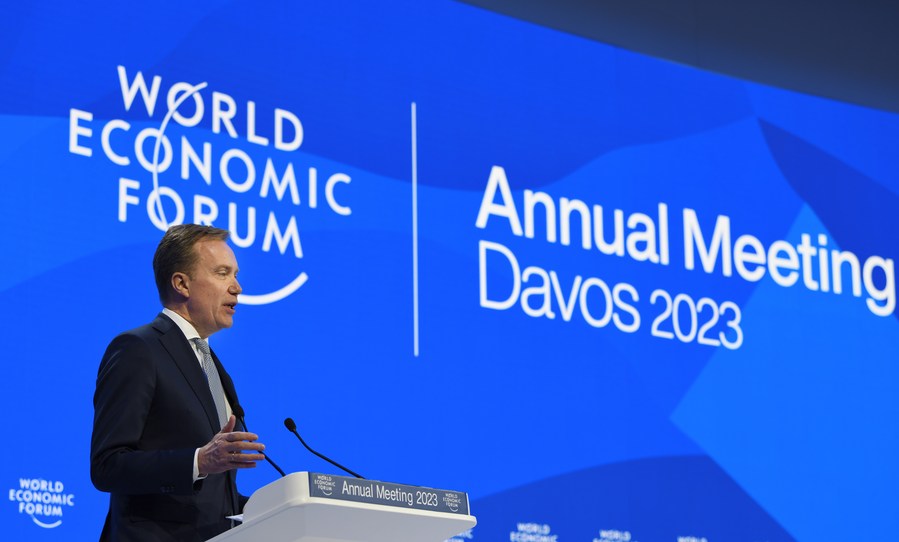
-
Published: 21 January 2023

Davos - Switzerland, Jan. 21 -2023
Reported by|Mackline Eddy - CJ - Economic section reporter
World Economic Forum (WEF) continues its meeting and introduces global economic reports as the presidents and leaders of the world gather in the Davos forum.
the forum confirmed that the global economy has regained steam after a facing critical period during the break out of the COVID-19 pandemic, and they refer to an increase in economic level repair despite their warning that world doesn't recover at all. Experts pointed out the world economic recovery is so far from certain.
Under the theme "Cooperation in a Fragmented World," the WEF's 2023 annual meeting concluded here on Friday. The meeting came amid unprecedented global challenges such as high inflation, an energy crisis, climate change, and geopolitical conflict.
Growth is on an upward trajectory and could witness a more robust recovery in 2023 through global cooperation and following China's adjusted COVID-19 response measures.
The global economic outlook is not as bad as feared months ago, "but less bad doesn't quite yet mean good," Kristalina Georgieva, the managing director of the International Monetary Fund (IMF), told a closing panel at the WEF. "We have to be cautious."
Georgieva said headline inflation was heading down. China's optimized COVID-19 response is expected to boost global growth, with the IMF forecasting the Chinese economy will reach an estimated 4.4 percent, far outpacing global growth.
Signs of declining inflation, resilient consumer spending, and strong labor markets, among others, suggest that growth could rebound in the short term.
"Be careful not to get on the other side of the spectrum, from being too pessimistic to being too optimistic. Stay in the middle of realism that seems to serve the world well," Georgieva said.
The WEF issued the Global Risks Report 2023, saying that conflict and geo-economic tensions have triggered a series of deeply interconnected global risks, with the cost of living crisis being the most significant short-term risk. At the same time, climate change and climate adaptation are the most considerable long-term concern.
Georgieva said that future growth prospects depend on how supply chain security is managed.
"If we diversify rationally, the cost of this adjustment would be low -- we put it down to 0.2 percent of GDP. If we trash trade that has been an engine for growth for so many decades, the cost can go up to 7 percent loss of GDP, equaling 7 trillion U.S. dollars," she said.
"Labor markets are holding firm so far, but interest rates are yet to bite, and if they bite more severely, then we can see unemployment going up. And it is very different for a consumer to have a cost of living crisis and a job than the cost of living crisis and no job," Georgieva said.
European Central Bank President Christine Lagarde was also cautious about the global economic outlook.
"The greatest tragedy in this moment would be if central banks were to lurch away from a focus on assuring price stability prematurely, and we were to have to fight this battle twice," said former U.S. Treasury Secretary Lawrence Summers.
Despite recent signs of improvement, "relief must not become complacency," Summers noted.
Attendees at the forum said cooperation would be for global growth. WEF President Borge Brende expressed confidence that "we can shape a more resilient, sustainable and equitable future," but "the only way to do it is together."
United Nations Secretary-General Antonio Guterres called for urgent action on several interconnected challenges, including the global economic crisis and climate. He underlined the need to "forge the pathways to cooperation in our fragmented world."
Leslie Maasdorp, vice president and chief financial officer of the New Development Bank, told Xinhua, "Without multilateral cooperation, you cannot really deal with challenges that are cross-national ... I believe that the one positive lesson we can learn from COVID is that we are interconnected."
Though challenges still threaten the global economy, attendees voiced hope that a severe recession may be avoided.
"We are now heading to a year where hopefully the corporates, the consumers, the state, policymakers will continue to have that resilient, determined approach to engineer the transitions that must take place," Lagarde said.
"The situation around the world must be improving a little bit," said Lagarde. "Players are moving from defense mode, that they had effectively been in 2021 and 2022, towards a more competitive mode."
In his closing remarks on Friday, Brende said despite the many complex issues facing the global community, progress had been made at the annual meeting, especially in tackling the most urgent crises of food, energy, and climate.
"For me, the greatest lesson of the week has been that although the world is more fragmented today, it does not need to be tomorrow," Brende said.
